-
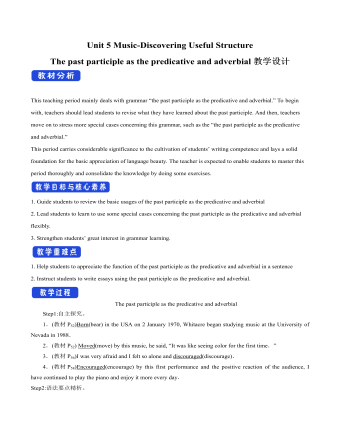
新人教版高中英语必修2Unit 5 Music-Discovering Useful Structures教案一
Step1:自主探究。1.(教材P52)Born(bear) in the USA on 2 January 1970, Whitacre began studying music at the University of Nevada in 1988.2.(教材P52) Moved(move) by this music, he said, “It was like seeing color for the first time.”3.(教材P56)I was very afraid and I felt so alone and discouraged(discourage).4.(教材P58)Encouraged(encourage) by this first performance and the positive reaction of the audience, I have continued to play the piano and enjoy it more every day.Step2:语法要点精析。用法1:过去分词作表语1).过去分词可放在连系动词be, get, feel, remain, seem, look, become等之后作表语,表示主语所处的状态Tom was astonished to see a snake moving across the floor.汤姆很惊讶地看到一条蛇正爬过地板。Finally the baby felt tired of playing with those toys.终于婴儿厌倦了玩那些玩具。注意:1).过去分词作表语时与被动语态的区别过去分词作表语时,强调主语所处的状态;而动词的被动语态表示主语是动作的承受者,强调动作。The library is now closed.(状态)图书馆现在关闭了。The cup was broken by my little sister yesterday.(动作)昨天我妹妹把杯子打碎了。2)感觉类及物动词的现在分词与过去分词作表语的区别过去分词作表语多表示人自身的感受或事物自身的状态,常译作“感到……的”;现在分词多表示事物具有的特性,常译作“令人……的”。
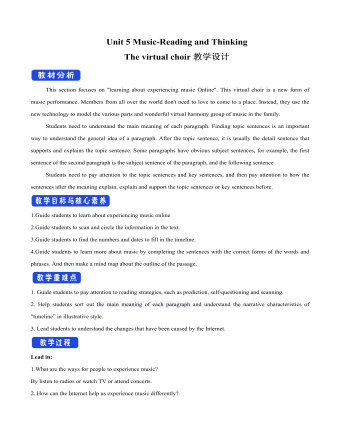
新人教版高中英语必修2Unit 5 Music-Reading and Thinking教案一
This section focuses on "learning about experiencing music Online". This virtual choir is a new form of music performance. Members from all over the world don't need to love to come to a place. Instead, they use the new technology to model the various parts and wonderful virtual harmony group of music in the family. Students need to understand the main meaning of each paragraph. Finding topic sentences is an important way to understand the general idea of a paragraph. After the topic sentence, it is usually the detail sentence that supports and explains the topic sentence. Some paragraphs have obvious subject sentences, for example, the first sentence of the second paragraph is the subject sentence of the paragraph, and the following sentenceStudents need to pay attention to the topic sentences and key sentences, and then pay attention to how the sentences after the meaning explain, explain and support the topic sentences or key sentences before.1.Guide students to learn about experiencing music online2.Guide students to scan and circle the information in the text.3.Guide students to find the numbers and dates to fill in the timeline.4.Guide students to learn more about music by completing the sentences with the correct forms of the words and phrases. And then make a mind map about the outline of the passage.1. Guide students to pay attention to reading strategies, such as prediction, self-questioning and scanning.2. Help students sort out the main meaning of each paragraph and understand the narrative characteristics of "timeline” in illustrative style.3. Lead students to understand the changes that have been caused by the Internet.
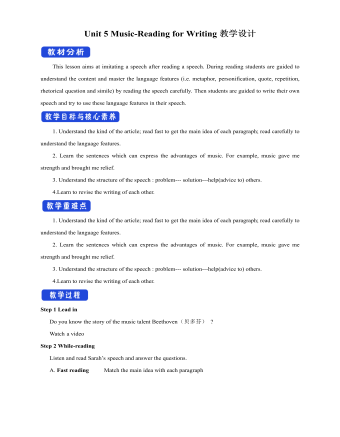
新人教版高中英语必修2Unit 5 Music-Reading for Writing教案二
The Internet celebrity Gao Yifeng. Years ago, he owned 5 companies and the staffs over 1,000, but during the economy crisis, he became nothing but debt. He was so worried that his hair became white overnight. There was a time when he wanted to killed himself. But after listening to the song Start Over by Liu Huan, he decided to cheer himself up. He started a steamed bun shop and gradually became a national chain shops. Now he became successful again.Walter Haddon said, “Music is the medicine of a troubled mind.” Music contains such a pleasant and inspiring force. Music gave him courage and bravery. When he listened to the song, it made his spirit fly like a kite in the wind. Music gave him strength and brought him relief. It was the rock I leant on to become strong and to get through those hard times. I hope none of us have to go through the same kind of suffering that he did. At the same time, we all go through various periods when we feel sad or alone. During those times, music can help us in the same way that it helped him. I hope we all will somehow begin to treasure music and make it a part of our life. Thank you for your listening !5.Revise your writing each other.Does he/she explain how music has changed his/her/someone else’s life?Are some of the rhetorical devices included and used properly ?Does he/she talk about how music makes him/her/someone feel?Is the first word in each sentences capitalised?Does he/she use correct punctuation ?
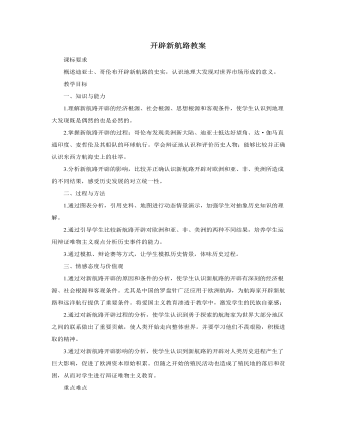
人教版高中历史必修2开辟新航路教案
材料五航路开辟后,东方香料输入欧洲的总量较中古之时猛增30倍,而胡椒、丁香等在印度购入和在英国卖出的差价亦高达10至29倍,其他货物的获利同样惊人。这一时期,新的商品不断涌现,特别值得注意的是美洲的特产——玉米、马铃薯、烟草、可可等——被传播到欧亚大陆。这时,世界性的对外贸易主要通过大西洋,地中海与意大利皆告衰落,而沿大洋的英、荷等渐居中心。到17世纪时,英国的伦敦与荷兰的阿姆斯特丹成为世界贸易中心。问题4:材料五表明,新航路开辟后对世界贸易产生了哪些重大影响?答案4:结束了世界相对孤立状态;各地文明开始会合交流,日益连成一个整体;欧洲商人直接同世界各地建立商业联系;促进不同国家和贸易的发展,促进世界市场雏形开始出现。

人教版高中历史必修2罗斯福新政教案
【教学参考】对“新政”作用的评价史学界对“新政”作用的评价是仁者见仁、智者见智,但基本上有三种观点,即“功大于过论”、“过大于功论”和“功过参半论”。持“功大于过论”者认为“新政”在美国历史上基本上是一种进步现象,首先,“新政”挽救了危机,使美国人民摆脱了危机的困苦局面;其次,在缺少足够的宏观经济政策知识的时代,罗斯福所做的努力确实是开创性的;再次,罗斯福“新政”开启了美国以后历届政府实施国家干预政策的大门,成为缓解自由主义经济制度之弊病的一剂良方,并在实质上加强了美国联邦政府的权威;最后,在30年代资本主义世界经济危机的背景下,同日本、德国为转嫁危机而发动战争的策略相比,“新政”无疑代表了一种进步、民主的解救危机方式。持“过大于功论”者认为“新政”未能使美国走出萧条、步入繁荣。
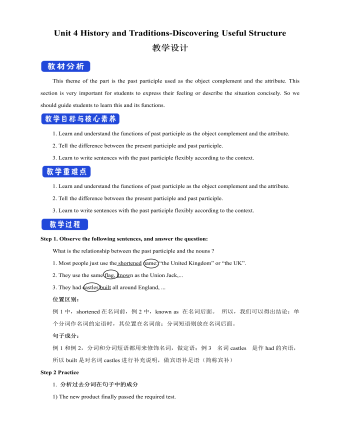
新人教版高中英语必修2Unit 4 History and Traditions-Discovering Useful Structure教案一
Step 5 Practice一、完成下列句子。1. Judy and I _______________(把车停下来(park))in an underground car Park near Trafalgar Square, where we could ______________________(让我们的车充电(charge)).2. When we finally reached the service desk to ask for audio guides, we heard it ___________ that there were no audio guides____________(留下,剩下).3. We__________________________(发现自己对...很惊讶)the large number of visitors and the amount of noise at the entrance of the National Gallery.4. Judy ____________________(眼神专注于) Van Gogh’s Sunflowers. It was hard to approach the painting as there were so many people around.5. She ____________________(把这幅画的复制品装箱(box)) to ensure that it was delivered safely.答案:1.had our car parked get our car battery charged 2. announced left 3. found ourselves very surprised 4. had her eyes fixed on 5. had a copy of the painting boxed二、用过去分词对下列句子进行改写。1. Loch Ness was surrounded by beautiful natural landscape, which made it look amazing.2. Carl and his friend stayed with a generous family who offered them bread with butter and honey that was homemade.3. The family’s ancestors once attended to soldiers who were wounded in the First World War.4. The young people were attracted by the legend of Loch Ness. They watched over the lake with their cameras and binoculars, which were positioned on the hill.答案:1. Loch Ness surrounded by beautiful natural landscape looks amazing.2. Carl and his friends stayed with a generous family who offered them homemade bread with butter and honey.3. The family’s ancestors once attended to wounded soldiers in the First World War.4. The young people attracted by the legend of Loch Ness watched over the lake with their cameras and binoculars positioned on the hill.
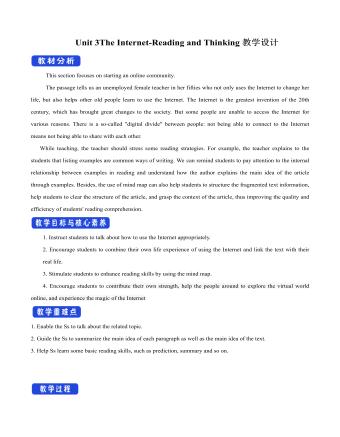
新人教版高中英语必修2Unit 3 The Internet-Reading and Thinking教案一
Paragraph 3. Jan decided to start an IT club to teach old people how to use computers and the Internet. Paragraph 4. Jan has started taking online classes to learn more about how to use the Internet to make society better. Paragraph 5. Jan’s life has been greatly improved by the Internet. Step 5: Critical thinking:(1)How do you arrange your time spent on study and the Internet? Is it reasonable? I usually surf the Internet using my mobile phone for only an hour after class, and it is reasonable for me.(2)What are your online activities? Are they safe? I chat with my friends, read news and play games. I never give away my private information so I think they are safe.Step 4: summary Much has been written about the wonders of the World Wide Web. There are countless articles (1)______(tell) us how the Internet has made our lives more convenient. But the Internet has done a lot (2)_____(much) for people than simply make life more convenient. People’s lives (3) _________________(change) by online communities and social networks so far. Take Jan for example, who developed a serious illness that made her (4)_____(stick) at home with only her computer to keep (5)___(she) company. She joined an online group (6)______ she could share problems, support and advice with others. She considered the ability to remove the distance between people as one of the greatest (7)_______(benefit). She was so inspired (8)____ she started an IT club in which many people have been helped. She has started to learn more about how to use the Internet to make society better. Her next goal is to start a charity website to raise money (9)___ children in poor countries. Jan’s life has been (10)______(great) improved by the Internet. Step 5 Homework:Review what we have learned and find out the key language points in the text.
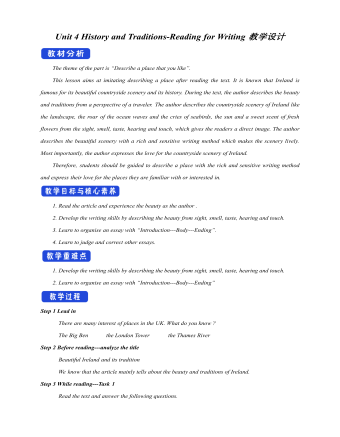
新人教版高中英语必修2Unit 4 History and Traditions-Reading for Writing教案
Step 1 Lead inThere are many interest of places in the UK. What do you know ?The Big Ben the London Tower the Thames RiverStep 2 Before reading---analyze the titleBeautiful Ireland and its traditionWe know that the article mainly tells about the beauty and traditions of Ireland. Step 3 While reading---Task 1Read the text and answer the following questions.Q1: What makes the Irish countryside exciting and inspiring?Its beauty and how it offers something for all the scenes.Q2: What are the best ways to experience some Irish traditions and cultures?By stopping by a village pub and relaxing with a drink and traditional meal while listening to music and watching dancingQ3: What is the meaning of “breathe in the sweet scent of fresh flowers while birds greet the new day with their morning song ?”It means to not just smell but also breathe in the smell of fresh flowers early in the morning as the birds sing their first song of the new day.Q4: What are the best ways to experience Chinese traditions and customs ?By travelling to different places and using all your senses to experience everything and by interacting with local people.Step 4 While reading---Task 2Analyze the descriptive paragraph1. Identify and underline the paragraph’s introductory sentence and the ending sentence.Introductory sentence: Ireland’s beautiful countryside has always had a great influence on its people and traditions.Ending sentence: And if you introduce yourself to a friendly face, you are more than likely to experience local culture and customs first-hand.2. The paragraph talks about different senses in different places. Write the senses and places in the order that they appear.
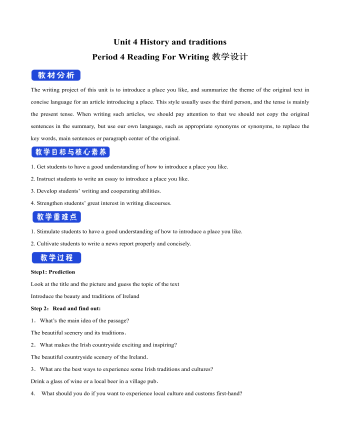
新人教版高中英语必修2Unit 4 History and traditions教案
这个地区有着深厚的传统。既学既练:为了让更多的外国游客了解中国文化,欣赏中国美丽的自然风光,感受中国发生的巨大变化,某外文杂志社将出版一本英语小册子来介绍中国的旅游景点。该杂志社邀请你为该小册子写一篇英语短文来介绍杭州,内容包括:1.杭州的位置(中国东南部)、面积(16 000多平方公里)及历史(2 200多年)等;2.杭州的旅游特色(自然风景、传统文化、特色小吃等);3.希望更多的游客来杭州参观。注意:1.词数80左右;2.可适当增加细节,以使行文连贯。Located in the southeast of China, Hangzhou is a beautiful city.Dating back more than 2,200 years, Hangzhou covers an area of more than 16,000 square kilometers.In Hangzhou, you can visit the West Lake, whose scenery is fascinating.In addition, you can’t miss its cultural relics and historical sites, from which you will learn more about excellent Chinese traditional culture and traditions.In Hangzhou, the special snacks are famous and visitors from different parts of the world think highly of them.As a tourist attraction, Hangzhou attracts a large number of visitors from home and abroad every year.Once you come to China, Hangzhou is a scenic spot you can’t miss.
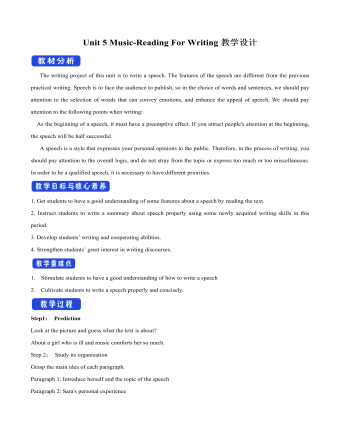
新人教版高中英语必修2Unit 5 Music-Reading For Writing教案一
(4)Now we have heard a number of outstanding speeches ... 我们已经聆听了许多精彩的发言……(5)Because we wanted the nations of the world, working together, to deal with ... 因为我们希望全世界各国团结起来去应对……(6)And if we do not act ... 如果我们不采取行动……(7)Now, I share the concerns that have been expressed ... 我也同意对于……表达的担心(8)Let us show the world that by working together we can ... 让我们告诉全世界,通过一起努力我们可以……(9)It is now time for us to ... 是时候我们……(10)And I have always wished that ... 我一直希望……(11)Thank you for letting me share this day with me.感谢你们和我共度这一天。实践演练:假如你是高中生李华,你校将举办一次以“音乐”为主题的演讲比赛,请你按照主题,写下你的演讲稿。注意:词数100左右。First of all, thank you for listening to my speech. My topic is: love music like love yourself.Music is like the air we need to maintain our normal lives around us. You can't imagine how terrible a world without music would be. Movies and TV shows have no music, only dry conversations and scenes; mobile phones only vibrations; streets only noisy crowds; cafes, western restaurants only depressed meals. What a terrible world it is!As a student, I hope we all can enjoy the fun brought by music in our spare time. Instead of just listening to music, we can even make our own music. Let's enjoy the fun of music!Thanks again for your attention!
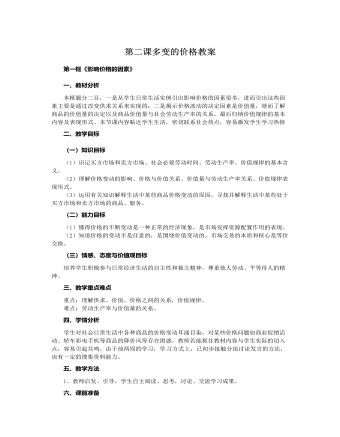
人教版高中政治必修1第二课多变的价格教案
(四)反思总结,当堂检测。本节内容讲述了价格变动对人们生活、生产的影响作用,主要知识框架如下:(1)、价格变动会影响人们的消费需求,商品价格上涨,人需求就减少,反之,则增大。价格变动对不同商品需求影响程度是不一样的,对生活必需品的需求量影响较小,对高档耐用品的需求量影响较大。相关商品价格变动对消费需求的影响不同,某种商品价格上涨,就会减少需求量,其替代品需求量增加,其互补品需求量则减少。(2)、价格变化也会影响生产经营,价格变动会调节生产,刺激生产者改进技术,提高劳动生产率,促使生产者生产适销对路的高 质量产品。(五)发导学案、布置预习。预习第三课第一框《消费及其类型》,完成预习导学案练习题九、板书设计《价格变动的影响》1、对人们生活的影响(1)商品价格变动与消费需求量之间的关系(2)不同商品的需求量对价格变动的反应程度不同
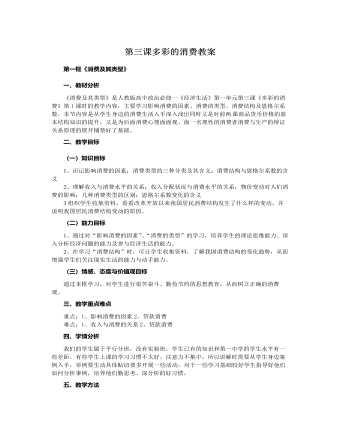
人教版高中政治必修1第三课多彩的消费教案
二、做理智的消费者1、量入为出,适度消费2、避免盲从,理性消费3、保护环境,绿色消费4、勤俭节约,艰苦奋斗十、教学反思本课的设计采用了课前下发预习学案,学生预习本节内容,找出自己迷惑的地方。课堂上师生主要解决重点、难点、疑点、考点、探究点以及学生学习过程中易忘、易混点等,最后进行当堂检测,课后进行延伸拓展,以达到提高课堂效率的目的。这节课我们主要学习了影响人们消费的几种消费心理和几种科学的消费观。本节课与学生生活十分贴近所以这节课充分的调动了学生学习的兴趣和积极性,并且让学生针对案例进行充分的分组讨论分析,通过学生的展示分析和补充可以知道学生们不但深层次分析了教学原理也透彻理解了教学重难点大大提高了课堂效率.。通过案例的分析进一步领会了教材原理突破了本节课的难点——树立正确的消费观。整堂课学生求知旺盛,复杂的知识变得简单化,从阅读教材到独立思考分析再到合作讨论最后的展示质疑答疑,加深了印象,提高了能力。
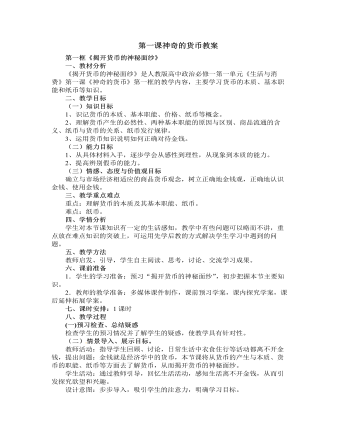
人教版高中政治必修1第一课神奇的货币教案
1、外汇与外币的关系:(1)外汇包括外币,但外汇不等于就是外币。外币是指外国的货币,包括外国的纸币、铸币;外汇通常是以外国货币表示的用于国际间结算的支付手段,具体包括外币、外币有价证券、外币支付凭证等。(2)外币属于外汇的范围,但不能把二者等同起来。通常情况下,只有可以自由兑换的外币才是外汇,因为外汇的实质是国际支付手段,如果某种货币不能自由兑换,它就不能成为国际支付手段。外汇执行的 主要是货币的支付手段的职能。(3)持有外汇意味着对外汇发行国拥有债权。持有外汇过多,一方面意味着国际支付能力强和有可能对外汇发行国施加影响;另一方面则意味着大量该由本国享受的资源,被借给外国利用,并要承担外汇贬值的风险。2、关于币值变化的分析:(1)对货币升值的具体分析:一个国家的货币升值(上浮)后,同量的这种货币能比以前换 取更多的他国货币,买到更多的他国商品。
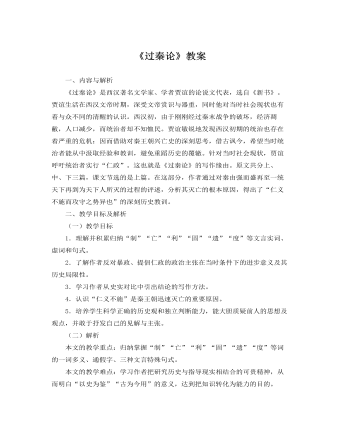
人教版高中语文必修3《过秦论》教案
二、文本解读方法点拨研读课文第三、第四段。要求:师范读,生轻声跟读,然后生齐读。方法:第三段秦统一天下前,应用较强的语势读出,充分渲染塑造一个“威加海内”的帝王形象。统一天下之后,秦王朝至此已达顶峰,这意味着从此转入守势。这段文字义正词严,充分揭露了秦的暴虐无道,故诵读应有“声讨”之势。末句“天下已定”总承以上内容,其后应有较长停顿,然后转入叙秦始皇的心态,用以反衬下文灭亡之速,读时须有嘲讽意,突出“自以为”“万世之业”等词语。第四段起首“始皇既没,余威震于殊俗”两句,暗示民心不服,人人自危,宜用从容、沉着的语调读出。“然陈涉瓮牖绳枢之子……”急转直下,稍作停顿,以下先抑(“陈涉”至“之富”)后扬(“蹑足”至段末)宜读出对比情调。末句叙事结束全篇,要读得沉着、有力。三、信息筛选学生自译课文(一)学生参照文下注释,口译第三、四段,遇有疑难则作好相应标记,为讨论做好准备。
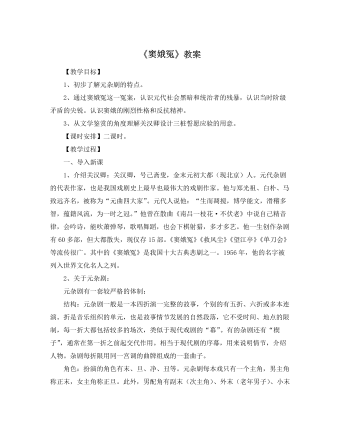
人教版高中语文必修4《窦娥冤》教案
窦娥的三桩誓愿明明是幻想,却偏偏写成现实,明明是不合理的偏偏写成合理的,这说明了什么?明确:这说明在当时的历史条件下,除了乞求天地鬼神申诉冤屈以外,没有别的办法,作者采用这种浪漫主义的表现手法,一是表明社会的腐败黑暗,二是刻画窦娥强烈的反抗精神,三是表达人民要惩治邪恶的愿望。“煞”就是结尾的曲牌,为什么关汉卿要把“煞”分成[二煞][一煞][煞尾]三个曲牌呢?明确:说明蓄积在窦娥胸中的怒火再也无法控制,犹如地下岩浆,冲向决口。也说明剧作家意犹未尽,他要把窦娥的无辜受害,要把人们对窦娥的同情,要把人们对统治者的愤恨表现得痛痛快快,淋漓尽致。于是在结尾处一波三折,把高潮推向顶峰。《窦娥冤》中有两句唱词,两个牌文本不同,试分析其优劣。《古名家杂剧》本:地也,你不分好歹难为地;天也,我今日负屈衔冤哀告天。
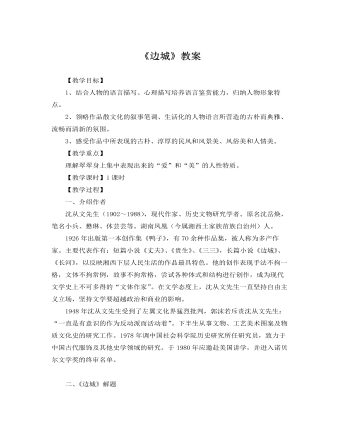
人教版高中语文必修5《边城》教案
【教学过程】一、介绍作者沈从文先生(1902~1988),现代作家、历史文物研究学者。原名沈岳焕,笔名小兵、懋琳、休芸芸等。湖南凤凰(今属湘西土家族苗族自治州)人。1926年出版第一本创作集《鸭子》,有7O余种作品集,被人称为多产作家。主要代表作有:短篇小说《丈夫》、《贵生》、《三三》,长篇小说《边城》、《长河》,以反映湘西下层人民生活的作品最具特色。他的创作表现手法不拘一格,文体不拘常例,故事不拘常格,尝试各种体式和结构进行创作,成为现代文学史上不可多得的“文体作家”。在文学态度上,沈从文先生一直坚持自由主义立场,坚持文学要超越政治和商业的影响。1948年沈从文先生受到了左翼文化界猛烈批判,郭沫若斥责沈从文先生:“一直是有意识的作为反动派而活动着”。下半生从事文物、工艺美术图案及物质文化史的研究工作。1978年调中国社会科学院历史研究所任研究员,致力于中国古代服饰及其他史学领域的研究。于1980年应邀赴美国讲学,并进入诺贝尔文学奖的终审名单。
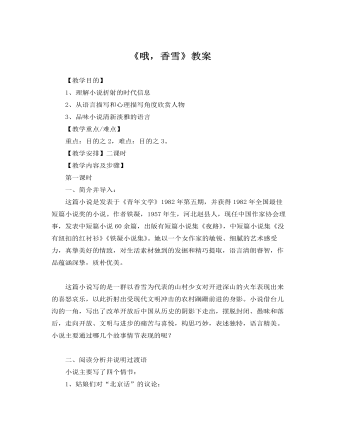
人教版高中语文必修5《哦,香雪》教案
【教学内容及步骤】第一课时一、简介并导入:这篇小说是发表于《青年文学》1982年第五期,并获得1982年全国最佳短篇小说奖的小说。作者铁凝,1957年生,河北赵县人,现任中国作家协会理事,发表中短篇小说60余篇,出版有短篇小说集《夜路》,中短篇小说集《没有纽扣的红衬衫》《铁凝小说集》。她以一个女作家的敏锐、细腻的艺术感受力,真挚美好的情致,对生活素材独到的发掘和精巧提取,语言清朗睿智,作品蕴涵深挚,质朴优美。这篇小说写的是一群以香雪为代表的山村少女对开进深山的火车表现出来的喜怒哀乐,以此折射出受现代文明冲击的农村蹒跚前进的身影。小说借台儿沟的一角,写出了改革开放后中国从历史的阴影下走出,摆脱封闭、愚昧和落后,走向开放、文明与进步的痛苦与喜悦,构思巧妙,表述独特,语言精美。小说主要通过哪几个故事情节表现的呢?
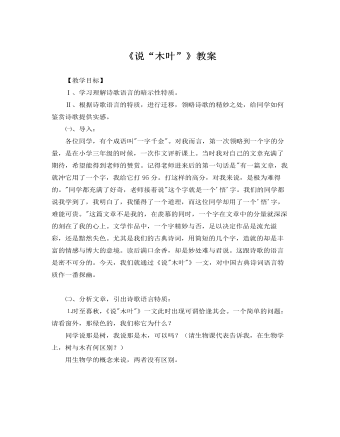
人教版高中语文必修5《说“木叶”》教案
【教学目标】Ⅰ、学习理解诗歌语言的暗示性特质。Ⅱ、根据诗歌语言的特质,进行迁移,领略诗歌的精妙之处,给同学如何鉴赏诗歌提供实感。㈠、导入:各位同学,有个成语叫"一字千金"。对我而言,第一次领略到一个字的分量,是在小学三年级的时候,一次作文评析课上。当时我对自己的文章充满了期待,希望能得到老师的赞赏。记得老师进来后的第一句话是"有一篇文章,我就冲它用了一个字,我给它打95分。打这样的高分,对我来说,是极为难得的。"同学都充满了好奇,老师接着说"这个字就是一个'悟'字。我们的同学都说我学到了,我明白了,我懂得了一个道理,而这位同学却用了一个'悟'字,难能可贵。"这篇文章不是我的,在羡慕的同时,一个字在文章中的分量就深深的刻在了我的心上。文学作品中,一个字精妙与否,足以决定作品是流光溢彩,还是黯然失色。尤其是我们的古典诗词,用简短的几个字,造就的却是丰富的情感与博大的意境。读后满口余香,却是妙处难与君说。这跟诗歌的语言是密不可分的。今天,我们就通过《说"木叶"》一文,对中国古典诗词语言特质作一番探幽。
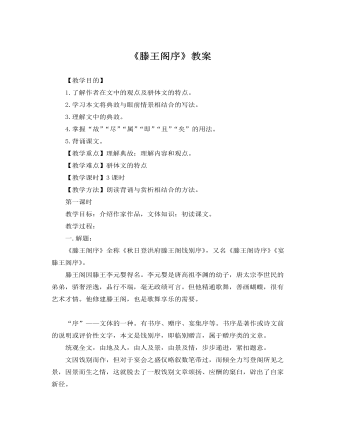
人教版高中语文必修5《滕王阁序》教案
⒈作者是如何写洪州的地理风貌的?突出了什么特点?明确:“豫章故郡,洪都新府。”――历史久远“星分翼轸,地接衡庐”――界域辽阔。“襟三江而带五湖,控蛮荆而引瓯越”――地势宏伟2.作者怎样写参加宴会的人物,照应了前文的哪个词语?明确:作者在写参加宴席人物时,用了“雅望”“懿范”“胜友”“高朋”“腾蛟起凤”“紫电清霜”等词语,极尽人物的文韬武略,照应了前文的“俊采”一词。3.文章开始不写楼台,不写宴会,而先写地势与人物,这样写有何好处?明确:文章借用铺陈的手法,历叙界域之大,地势之雄,物产丰富,人才俊美,既渲染了和乐的氛围、宴会的高雅,同时也紧扣照应了题目《秋日登洪府滕王阁饯别序》7.小结:本段略写洪州的地理风貌,极写滕王阁的无限壮美,和周围环境的超凡脱俗,以及阁中如云高朋的文才武略。这样写,既初步写出了滕王阁的不同凡响,又为后文详写做好了铺垫。
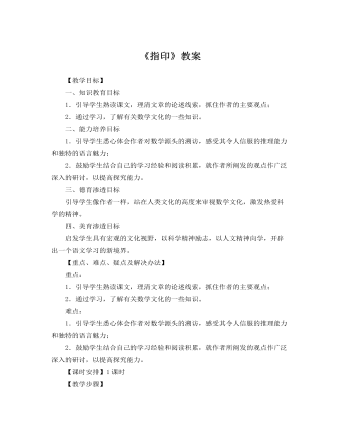
人教版高中语文必修5《指印》教案
一、明确目标1.引导学生熟读课文,理清文章的论述线索,抓住作者的主要观点;2.通过学习,了解有关数学文化的一些知识;3.引导学生悉心体会作者对数学源头的溯访,感受其令人信服的推理能力和独特的语言魅力;二、整体感知1.导入新课"屈指可数""弹指一挥见",手指在生活中的计数功能,直接催生了数学这门科学,丹齐克的《指印》为我们揭开了这二者的关系(板书课题)。2.作者及相关背景介绍丹齐克(1884-1956),原籍立陶宛,曾在巴黎大学求学。1910年去美国,入美国国籍,先后在哥伦比亚大学、约翰·霍普金斯大学、马里兰大学讲授数学。三、重点、难点的学习与目标达成过程1.感知课文,明确本文的整体写作思路。(1)学生读课文,整理文章的结构脉络。(2)小组交流讨论。





















